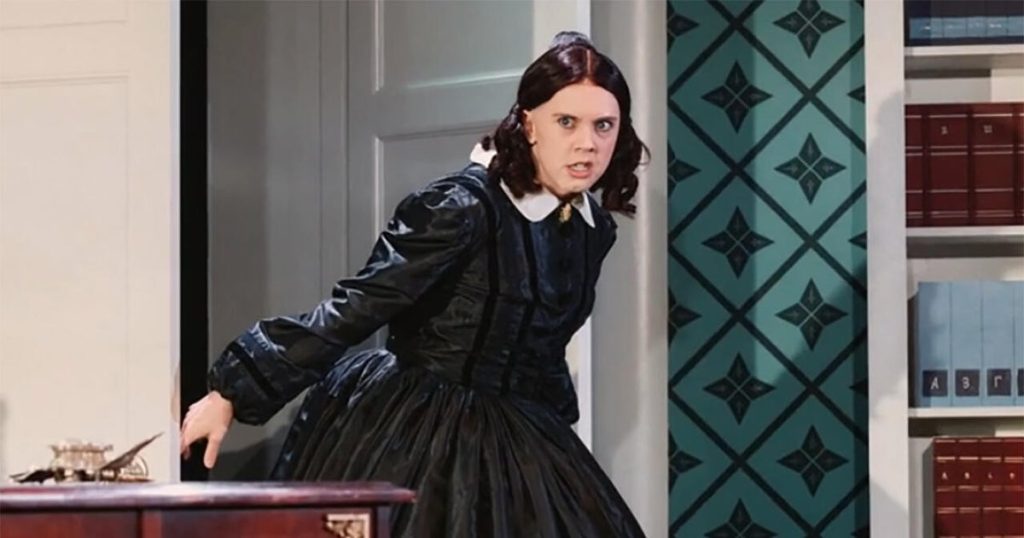Broadway has welcomed a refreshingly unique offering this season with “Oh, Mary!” This exuberant comedy, crafted by and starring Cole Escola, provides a whimsical and decidedly non-historical interpretation of first lady Mary Todd Lincoln. Set against the backdrop of the Civil War, the play paints an outrageous picture of Mary’s aspirations to become a cabaret star, clashing hilariously with her husband Abraham Lincoln‘s attempts to keep the nation united. Despite its unconventional premise, the production has achieved box office success, even earning several Tony nominations.
| Article Subheadings |
|---|
| 1) The Unconventional Premise |
| 2) The Inspiration Behind the Show |
| 3) From Small Beginnings to Broadway Success |
| 4) Personal Background of Cole Escola |
| 5) The Future of “Oh, Mary!” |
The Unconventional Premise
In “Oh, Mary!”, Cole Escola explores the life of Mary Todd Lincoln through a highly unconventional lens. The play introduces viewers to Mary’s secret dream of succeeding as a cabaret singer during her husband’s presidency, juxtaposing political turmoil against personal aspiration. A pivotal dialogue between Mary and Abraham Lincoln captures this comedic tension:
“For God’s sake, Mary! How would it look for the first lady of the United States to be flitting about a stage right now in the ruins of war?”
This dialogue humorously sets the stage for a narrative that prioritizes Mary’s ambitions over historical accuracy. The comedic interactions shed light on the absurdities of life in a time of conflict, ultimately questioning societal norms of propriety during tumultuous periods.
The Inspiration Behind the Show
The inception of “Oh, Mary!” dates back to 2009 when Cole Escola penned a note to himself pondering the potential aftermath of Abraham Lincoln‘s assassination. He envisioned Mary’s life pivoting from the shadows of her husband’s legacy to embracing newfound independence:
“What if Abraham Lincoln’s assassination wasn’t such a bad thing for Mary Todd? Now I’m single. I can date.”
This seed of creativity blossomed into a full-fledged play that Escola hesitated to develop initially, fearing the outcome might not reflect his vision. As years passed, he acknowledged the importance of storytelling discretion and finally committed Mary Todd Lincoln’s journey to paper.
From Small Beginnings to Broadway Success
Upon its premiere, “Oh, Mary!” was met with enthusiastic reviews that propelled it from downtown venues to the bright lights of Broadway. The show not only resonates with audiences but also shines in the competitive theater landscape, earning Escola five Tony nominations, including accolades for both best play and best actor. The unexpected success highlights the show’s universal appeal, managing to both entertain and provoke thought amidst laughter:
“Inflation is high,” Escola remarked humorously about the show’s commercial prowess.
The play’s ability to break box office records serves as a reminder of the enduring fascination with historical figures, even when presented through a lens of humor and exaggeration.
Personal Background of Cole Escola
The story of Cole Escola is one of resilience and creativity. Raised in rural Oregon, Escola faced family challenges, including a tumultuous childhood marked by poverty and his father’s struggles with mental illness. As he shared, the traumatic experience of being chased from home left a lasting impact:
“When I was maybe five years old, my father chased us out of the home with a shotgun.”
After relocating to his grandmother’s home, Escola’s love for storytelling was nurtured through vivid tales that blurred the lines between reality and imagination. These moments shaped his artistic vision as well as his comedic style, allowing him to embrace diverse perspectives as he navigates his identity.
The Future of “Oh, Mary!”
With its current success, “Oh, Mary!” seems poised for an even brighter future. The show’s lyrical writing and extravagant comedy have struck a chord with audiences craving fresh material. As Escolar reflected, the success of the play is a testament to its authenticity:
“I wrote this for me and my friends, and for my audience, and the fact that it’s successful is incredibly special.”
Continued recognition for Cole Escola and “Oh, Mary!” opens avenues for possible future adaptations and expansions of the story, showcasing the complexity of historical figures through a modern comedic lens.
| No. | Key Points |
|---|---|
| 1 | “Oh, Mary!” features a comedic reinterpretation of Mary Todd Lincoln’s life, focusing on her aspirations as a cabaret star. |
| 2 | The play originated from Cole Escola‘s ideas in 2009, evolving through years of thoughtful development. |
| 3 | The production has earned multiple Tony nominations and achieved significant box office success. |
| 4 | Escola’s personal background includes overcoming personal and familial difficulties, driving his creative journey. |
| 5 | The show’s authenticity in storytelling contributes to its ongoing appeal and future potential. |
Summary
The opening of “Oh, Mary!” not only highlights the versatility of Broadway but also serves as a platform for showcasing unique narratives that resonate within contemporary society. Cole Escola‘s bold reinterpretation of Mary Todd Lincoln challenges traditional views on historical figures, blending humor with poignant themes of identity and freedom. As this production continues to break barriers, it indicates a proliferation of creative storytelling that not only entertains but provokes thoughtful discourse.
Frequently Asked Questions
Question: What themes are explored in “Oh, Mary?”
The play explores themes of identity, ambition, and the absurdities of societal norms during times of conflict, all through a comedic lens.
Question: Who is Cole Escola?
Cole Escola is a playwright and actor known for blending humor with poignant narratives, most notably illustrated in “Oh, Mary!”
Question: How does “Oh, Mary!” differ from traditional Broadway productions?
Unlike many Broadway productions, “Oh, Mary!” is an original work with no major movie stars, focusing instead on unique storytelling and character development.


